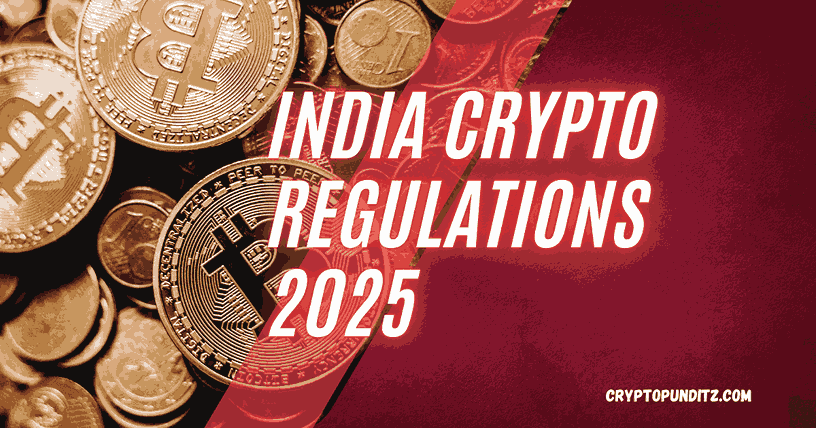India has been at the forefront of global cryptocurrency adoption, ranking as the world’s top country for crypto usage for the second consecutive year. However, the government’s evolving stance on crypto regulations in 2025 has sparked uncertainty among Bitcoin and Ethereum traders. With stricter compliance requirements, potential tax revisions, and regulatory oversight, traders and investors must navigate this new landscape carefully.

Key Highlights of India’s New Crypto Regulations
1. Increased Taxation on Crypto Gains
As of February 2025, India has retained its 30% tax on crypto gains, and additional levies continue to impact traders:
- A 1% TDS (Tax Deducted at Source) on all crypto transactions, unchanged from previous regulations.
- An 18% GST on crypto exchange service fees, making trading more expensive for Indian investors.
These tax policies have significantly reduced trading volumes on Indian exchanges. Reports indicate a decline in overall crypto transactions, with many users shifting to peer-to-peer (P2P) trading.
2. Stronger KYC and Compliance Requirements
India’s Financial Intelligence Unit (FIU) has mandated stricter Know Your Customer (KYC) norms for crypto exchanges. Key requirements include:
- Full identity verification before trading.
- Mandatory declaration of the source of funds for deposits above ₹5 lakh.
- More scrutiny on transactions over ₹10 lakh to curb money laundering.
This has led to a significant increase in compliance costs for exchanges, discouraging some users from centralized platforms.
3. Restrictions on Offshore Crypto Exchanges
To prevent capital outflows, India has blocked several offshore exchanges from operating without registration under the Prevention of Money Laundering Act (PMLA). Binance, Bybit, and OKX were recently issued compliance notices, prompting many traders to shift to decentralized exchanges (DEXs) like Uniswap.
4. Government Plans for Digital Rupee Expansion
The RBI’s push for the Digital Rupee (CBDC) is an attempt to reduce reliance on private cryptocurrencies like Bitcoin and Ethereum. In 2025, the Digital Rupee pilot program has expanded to 25+ banks, increasing concerns that future regulations may further restrict crypto transactions in favor of CBDC adoption.
How These Regulations Affect Bitcoin and Ethereum Traders
1. Reduced Liquidity and Higher Costs
Due to higher taxation and compliance rules, trading volumes on centralized exchanges have dropped. Many traders are switching to peer-to-peer (P2P) platforms and decentralized exchanges (DEXs) to avoid heavy transaction costs.
2. Shifting Towards Offshore and P2P Transactions
Indian traders are increasingly using USDT-based P2P trading to bypass heavy taxation. Reports indicate a rise in P2P Bitcoin transactions in early 2025 compared to last year.
3. Potential Impact on Long-Term Investments
With tighter regulations, long-term holders of Bitcoin and Ethereum must assess:
- Whether to shift holdings to international exchanges.
- If investing in tokenized assets on the Digital Rupee blockchain could provide better alternatives.
- The impact of global regulatory changes, as India aligns with FATF’s crypto compliance framework.
What’s Next for Indian Crypto Traders?
Lobbying for Lower Taxes
Crypto industry leaders and exchanges are pushing for a reduction in TDS from 1% to 0.1% to encourage legal trading. The Indian government is reviewing these demands, but no official announcements have been made.
Rise of Decentralized Finance (DeFi)
With increased restrictions on centralized exchanges, many traders are moving to DeFi platforms like Aave, Compound, and Uniswap to maintain anonymity and lower costs.
Legal Challenges and Policy Changes
Several petitions have been filed in the Supreme Court challenging the high crypto tax rates. Experts predict that a policy revision may occur in the Union Budget 2026 if crypto adoption continues to rise despite restrictions.
5 FAQs with Answers
1. How does the 1% TDS impact small-scale Bitcoin traders in India?
The 1% TDS applies to all crypto transactions, meaning small traders must factor in additional costs, even for low-value trades. This discourages high-frequency trading and has led many investors to explore alternative trading methods such as P2P platforms.
2. Can Indian traders legally use decentralized exchanges like Uniswap in 2025?
Yes, Indian traders can use decentralized exchanges (DEXs) like Uniswap, but they must still comply with tax laws. Since DEXs operate without central authority control, they offer an alternative for traders looking to bypass restrictions on centralized exchanges.
3. What happens if I don’t declare my crypto earnings under the new tax laws?
Failing to report crypto earnings can lead to penalties, fines, and legal consequences. The Indian government has enhanced monitoring mechanisms to track crypto transactions and non-compliance may result in severe penalties.
4. Will the Digital Rupee fully replace cryptocurrencies like Ethereum in India?
While the Digital Rupee (CBDC) is being promoted for mainstream transactions, it is unlikely to fully replace decentralized cryptocurrencies like Ethereum. However, further regulations may impact how cryptocurrencies are used in India.
5. Which Indian exchanges offer the lowest trading fees under the new regulations?
Some of the lowest-fee exchanges currently operating in India include CoinDCX and ZebPay. However, P2P trading has become more popular due to the lower transaction costs associated with it.
Kraken Cryptocurrency Exchange Re-entry into Indian Market 2025 – Click Here
Conclusion
India’s new crypto regulations have created a challenging landscape for Bitcoin and Ethereum traders. While taxation and compliance burdens increase, many investors are seeking alternative trading methods, including P2P platforms and DeFi. The future of crypto trading in India will depend largely on how policymakers balance regulation with innovation in the coming years.